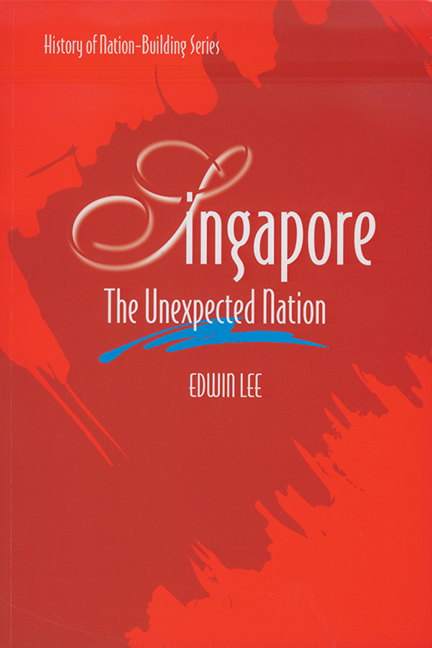Book contents
- Frontmatter
- Dedication
- Contents
- Preface
- Introduction by Wang Gungwu
- Chapter One Beginnings: From Temasek to Singapore
- Chapter Two Race, History and Nationalism
- Chapter Three Contestants and Contesting Visions
- Chapter Four The Accidental Chief Minister
- Chapter Five The Terminal Chief Minister
- Chapter Six The Embattled Prime Minister
- Chapter Seven Merger: Contesting Ownership and Principles
- Chapter Eight Terms of Disendearment
- Chapter Nine Dare to be Equal
- Chapter Ten The Way to Survive
- Chapter Eleven National Service: The Price of Independence
- Chapter Twelve Politics of Education
- Chapter Thirteen Home Ownership, National Stability and the New Middle Classes
- Chapter Fourteen University and Nation
- Chapter Fifteen Toh's Nation-Building Thrust
- Chapter Sixteen Nantah: Between Community and Nation
- Chapter Seventeen Self-Renewal: Talents for a Tough Act
- Chapter Eighteen The Consensual Prime Minister
- Chapter Nineteen Confucianism, Christianity, Chineseness
- Chapter Twenty Singapore Dreams, Singapore Dilemmas
- Chapter Twenty-One The Hyphenated Singaporean
- Chapter Twenty-Two The Unexpected Nation
- Bibliographical Note
- Index
- The Author
Chapter Six - The Embattled Prime Minister
Published online by Cambridge University Press: 21 October 2015
- Frontmatter
- Dedication
- Contents
- Preface
- Introduction by Wang Gungwu
- Chapter One Beginnings: From Temasek to Singapore
- Chapter Two Race, History and Nationalism
- Chapter Three Contestants and Contesting Visions
- Chapter Four The Accidental Chief Minister
- Chapter Five The Terminal Chief Minister
- Chapter Six The Embattled Prime Minister
- Chapter Seven Merger: Contesting Ownership and Principles
- Chapter Eight Terms of Disendearment
- Chapter Nine Dare to be Equal
- Chapter Ten The Way to Survive
- Chapter Eleven National Service: The Price of Independence
- Chapter Twelve Politics of Education
- Chapter Thirteen Home Ownership, National Stability and the New Middle Classes
- Chapter Fourteen University and Nation
- Chapter Fifteen Toh's Nation-Building Thrust
- Chapter Sixteen Nantah: Between Community and Nation
- Chapter Seventeen Self-Renewal: Talents for a Tough Act
- Chapter Eighteen The Consensual Prime Minister
- Chapter Nineteen Confucianism, Christianity, Chineseness
- Chapter Twenty Singapore Dreams, Singapore Dilemmas
- Chapter Twenty-One The Hyphenated Singaporean
- Chapter Twenty-Two The Unexpected Nation
- Bibliographical Note
- Index
- The Author
Summary
Coping with the Communists
One of the first words Lee exchanged with the governor, Sir William Goode, after the election concerned the release of the detainees, a matter on which Goode had to refer to London. Lee had a schedule as follows: hold a post-election rally, release the detainees, and hold a press conference on the same day, and then be sworn in as the government. He wanted to have a rally without the detainees, and it was held on the night of 3 June. The detainees were released to face the press on 4 June. The government was sworn in on 5 June.
Lee had planned the order of events to ensure that each one would grab the day's headlines. Lim Chin Siong, Fong Swee Suan, Devan Nair, Sandrasegeram Woodhull, and James Puthucheary were among the eight detainees released. Their signed statement was given to the press in a conference and published the next day. The statement contained the key sentence: “To achieve complete identification with the ideal of a united Malayan nation, and to struggle by peaceful, democratic, and constitutional means for the enduring objective of a united, independent, democratic and non-communist, and socialist Malaya.”
Lim, Fong, Nair, and Woodhull received appointment as political secretaries in various ministries, while Puthucheary was made the manager of a new Industrial Promotions Board. Clearly they were thought of with cautious optimism.
Meanwhile, the labour scene was in some kind of disarray. The Lim Yew Hock Government, while closing the communist unions, had encouraged others to form, and these had mushroomed, aided by the Trades Union Ordinance which permitted any seven persons to form a union. Lim Yew Hock's idea seemed to have been to replace the big communist federation of unions with lots of small unions, and by 1959, when the PAP took office, there were more than 200 unions around, more than 50 per cent of which had fewer than 250 members. K.M. Byrne, the PAP Minister for Labour and Law, did not like these “splinter” unions which he thought were easily exploitable by employers. So it was decided that a union must have a minimum of 250 members, must fit into one of nineteen categories, each to be formed into a federation, and must be affiliated to something big, meaning, “obviously the Trades Union Congress”.
- Type
- Chapter
- Information
- SingaporeThe Unexpected Nation, pp. 159 - 188Publisher: ISEAS–Yusof Ishak InstitutePrint publication year: 2008

